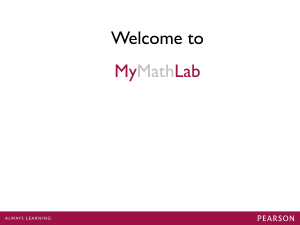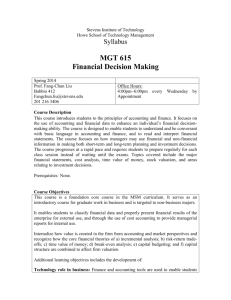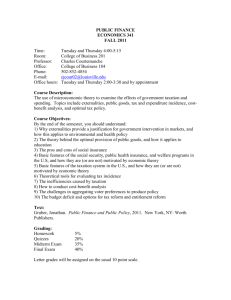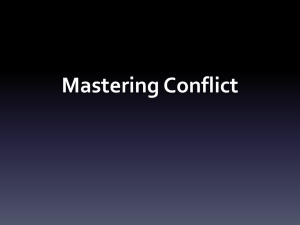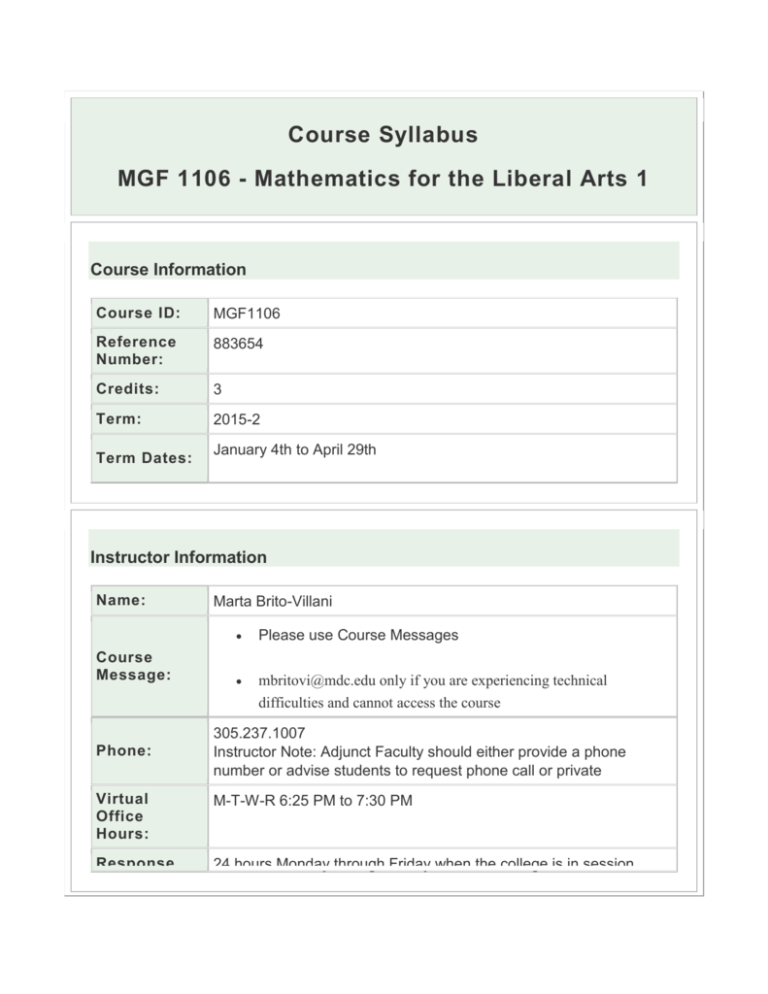
Course Syllabus
MGF 1106 - Mathematics for the Liberal Arts 1
Course Information
Course ID:
MGF1106
Reference
Number:
883654
Credits:
3
Term:
2015-2
Term Dates:
January 4th to April 29th
Instructor Information
Name:
Course
Message:
Phone:
Marta Brito-Villani
Please use Course Messages
mbritovi@mdc.edu only if you are experiencing technical
difficulties and cannot access the course
305.237.1007
Instructor Note: Adjunct Faculty should either provide a phone
number or advise students to request phone call or private
Virtual
Office
Hours:
M-T-W-R 6:25 PM to 7:30 PM
Response
24 hours Monday through Friday when the college is in session
Policy:
Course Description
Topics include: Sets and logic; geometry; probability and statistics.
Prerequisites
MAT 1033 with a grade of C or better or equivalent.
Miami Dade College's Learning Outcomes
This course addresses the following MDC learning outcomes:
Learning
Outcome #1:
Communicate effectively using listening, speaking, reading, and
writing skills.
Learning
Outcome #2:
Use quantitative analytical skills to evaluate and process numerical
data.
Learning
Outcome #3:
Solve problems using critical and creative thinking and scientific
reasoning.
Learning
Outcome #4:
Formulate strategies to locate, evaluate, and apply information.
Learning
Outcome #5:
Use computer and emerging technologies effectively.
Course Competencies
Upon completion of this course, the student will be able to:
Competency
1:
Competency
2:
Competency
3:
Competency
4:
Competency
5:
The student will be able to perform the following operations on sets.
Find complements, unions, intersections, subsets, and apply
DeMorgan’s laws.
Draw and apply Venn diagrams.
The student will be able to apply the rules of logic to:
Analyze/determine negations, disjunctions, conjunctions and
various forms of conditional statements.
Determine the validity of arguments, using symbolic logic
and/or Euler circles.
The student will be able to apply the basic counting techniques:
The Multiplication Rule (or Fundamental Counting Principle)
Combinations
The student will have a working knowledge of basic probability
theory, including being able to:
Describe a sample space and an event.
Calculate probabilities of simple, compound and conditional
events.
The student will have a working knowledge of basic concepts in
statistics, including being able to:
Distinguish between sampling methods.
Interpret data presented in graphs, charts and tables, as well
Competency
6:
as relationships between data sets.
Calculate and understand relationships between measures of
central tendency.
The student will have a working knowledge of basic concepts in
plane geometry, including being able to:
Round measurements; convert and determine appropriate
units of measure.
Compute perimeters, areas and volumes of various plane and
solid figures.
Distinguish between the various characteristics of
quadrilaterals.
Calculate angles in diagrams involving parallel lines.
Classify different types of triangles make angle computations,
apply the Pythagorean Theorem and Similar Triangles
Theorem
Required Textbook and Materials
You are required to purchase access to MyLab/Mastering (MyMathLab). When you
purchase access to MyLab/Mastering (MyMathLab), you will be able to access the
textbook online. Purchasing the textbook for this course is optional. If you want to
purchase the textbook, you will need to purchase a new copy which will give
your access to MyLab/Mastering.
ISBN13 for MyMathLab Access: 9780321199911
When you log into MyLab/Mastering, you will find the complete textbook online, along
with videotapes and homework tutorial assignments. When you have your access
code, go to www.coursecompass.com and click register. Follow the instructions to
register into MyLab/Mastering. When completing the registration, they will ask you for
the COURSE ID. The Course ID is XXXXXXX.
Supplemental Textbook and Materials
Thinking Mathematically, a la Carte Editon Plus NEW MyMathLab with Pearson
EText -- Access Card Package by Robert Blitzer, 2015 6th Ed, ISBN13:
9780321999061
Note: If you purchase this textbook, you will need to purchase a new copy which will
give your access to MyLab/Mastering.
Scientific Calculator strongly recommended (Scientific calculator - not graphing
calculator). Examples: TI30, TI30xa
Please refer to the Textbook Information page at the Virtual College website for specific
information on the College bookstores and procedures for ordering textbooks online.
Technology Requirements (Hardware/Software)
Please refer to the LMS Requirements and Plugin Information at the Virtual College
website. Mozilla Firefox is the recommended browser and headsets / microphone are
needed for participation in web-conferencing activities through Blackboard Collaborate;
webcam is optional. In addition, Microsoft Office applications such as Word, Excel and
PowerPoint are standard for Virtual College courses.
Due to the necessity of technology in Virtual College Courses, you must have a backup
plan for using an alternative computer with internet access in case of problems with
your personal computer. If you live in the South Florida area, you may use the computer
courtyards located on MDC campuses. If you have a technology problem that affects
your ability to access your online course, please notify your instructor immediately. If
you can access other internet sites but cannot access your online course, you need to
contact the Virtual College Help Desk at 305.237.3800 to seek assistance.
If you have no internet access at all, it is not a Virtual College / online course issue.
Please be aware that the Virtual College's Help Desk does not cover problems that you
may be experiencing with your computer hardware, installation of software, internet
connection, or other technical problems that may require a technician or intervention
from your Internet Service Provider.
Course Content
The course is organized as follows:
Module 1:
Getting Started
Module 2:
Logic
Module 3:
Probability
Module 4:
Statistics
Module 5:
Geometry
Course Work Requirements
To successfully complete this course, you need to spend at least an average of 12
hours per week on the course, which includes readings, postings, quizzes, exams, etc.
Set up a weekly time schedule that allows you sufficient time to complete the assigned
course work by the required due dates. Plan to check-in and complete assignments at
least three times a week. Do not procrastinate! Turn your work in early or by the due
date.
The time required to successfully complete this online course has been carefully
structured to be similar to the amount of time required to successfully complete a
traditional course in the classroom.
To successfully complete this course, students must:
Read the online textbook in MyLab/Mastering, watch the online videos in
MyLab/Mastering, read all modules contained in BlackBoard, and complete the
assigned homework in MyLab/Mastering.
Participation
There are four discussion boards in this class. By participating in
these you will review module content and also identify how you can
use what you are learning in your day-to-day life.
Exercise Sets
(10% of the
grade)
All online homework sets in MyLab/Mastering are to be completed
before taking the corresponding quiz.
Five quizzes
(45% of the
grade)
Practice quizzes will be available for each unit prior to the graded
quiz. You can take the practice quizzes as many times as you wish.
The practice quiz does not count toward your overall class
grade. The practice quizzes are available in MyLab/Mastering, and
the actual quizzes are available in BlackBoard. All quizzes will be
multiple choice.
Midterm and
Final Exam Proctored
(40% of the
overall grade 20% each
exam)
Practice tests in MyLab/Mastering will be available for each unit
prior to the graded exam. You can take the practice exam as many
times as you wish. The practice exam does not count toward your
overall class grade. The Midterm and the Final are proctored
exams.
For 10 extra points on the final exam, you may search the Internet
for websites that talk about logic, probability, statistics, or
geometry. You must find at least 10 sites to earn the 10 extra
points.
The quizzes only cover the material covered. The Midterm covers
only the material covered in the first half of the course. The Final
covers only the material covered after the midterm.
Exams will be multiple choice.
Sample tests will be found in MyLab/Mastering.
The proctored midterm and final must be completed within the
testing window established by the Virtual College. Please check
the course calendar to find the testing dates for the proctored
exams required in this course.
Students currently have three options when taking a proctored
assessment:
1. MDC Testing Center(s)
2. Remote Proctors and
3. Technology Supported Proctoring
Please visit Virtual College Testing Information for very important
information about proctored testing.
Exams:
The quizzes only cover the material covered. The Midterm covers
only the material covered in the first half of the course. The Final
covers only the material covered after the midterm.
All quizzes and tests will be multiple choice.
Sample tests will be found in MyLab/Mastering.
Late and
Make-up
Policy:
There will be NO MAKE-UPS. Keep in mind the dates and times
that all quizzes, exams and tutorial assignments are due.
If you have proctored exams please direct students to this website
for testing center information:
http://www.mdc.edu/virtual/resources/testing.aspx
Grading
Grading Criteria
Course Requirements
Percentage
Participation/Discussions
5%
Assignments
10%
Quizzes
45%
Midterm Exam
20%
Final Exam
20%
Total Points Possible
100%
Miami Dade College's Letter Grades
Range
Letter Grade
90 - 100
A
80 - 89
B
70 - 79
C
65 - 69
D
64 and below
F
Miami Dade College Policies
Students' Rights and Responsibility Handbook
This handbook provides you with the basic information you need to know as a
student at Miami Dade College. Please review the Student's Rights and
Responsibilities Handbook to learn about policies addressing code of conduct,
grade appeals, religious observations, services for students with special needs,
and many other areas. Due to the nature of the online environment, the
information below supplements the Handbook for Virtual College students.
Academic Dishonesty
Please carefully review the Academic Dishonesty policies in the Student's
Rights and Responsibilities Handbook.
The Handbook identifies "cheating on an examination" as one of the actions
included under academic dishonesty. In this course, you are expected to
complete quizzes and exams independently and without access to the course's
online content or your own study notes. Having multiple browser windows
open, accessing previous quizzes or course readings, and using your course
notes while taking a quiz or exam constitute cheating. All your course activity is
recorded by the Blackboard system; activity logs during the times when you are
taking quizzes / exams that demonstrate access to other course components
constitute evidence of cheating, and may result in a failing grade for the
corresponding quiz or exam.
You may have access to content in completed quizzes / exams. Copying,
photographing, or any form of duplicating content in any assessment violates
the integrity of the assessment. Such actions will be viewed as academic
dishonesty and may result in a failing grade for the corresponding quiz or
exam.
Plagiarism is another action identified as academic dishonesty in the
Handbook. Presenting the work or ideas of someone else as one's own
constitutes plagiarism, which is why students are always expected to cite their
sources. Through the use of Turnitin, unoriginal work can be easily identified; if
not sourced, this constitutes evidence of plagiarism, and may result in a failing
grade for the corresponding assignment.
Course Withdrawal
After registering, students may change their schedules during the drop / add
period. The dates for this period are listed on the Academic Calendar that may
be found as a link on the Miami Dade College homepage.
If you decide to drop this course and you desire a full refund, you must do so
before the last day to withdraw with a full refund (see College Academic
Calendar for date). If you stop logging on to class without officially withdrawing
through the Registrar's Office, the instructor may withdraw you for
nonattendance. If you continue to log on but do not participate in the class and
complete assignments, the instructor may withdraw you for inactivity.
Students who do not actively participate in classes may be dropped. For
classes in the Virtual College, students must participate in activities such as
discussions, assignments, etc. Simply entering a course (logging in) does not
constitute active participation.
Incomplete Grades
An Incomplete is given only where extenuating circumstances exist, such as
documented medical problems or a death in the family, and is issued solely at
the discretion of the instructor. If the instructor agrees to grant an Incomplete, a
written agreement must be completed between the instructor and the student,
specifying the coursework to be completed, in what manner, and by when.
Failure to fulfill the terms of the contract by the end of the next major term will
result in an "F" for the course. A student may not remove an Incomplete by
registering in a subsequent term to re-take the course.
For more information on Incomplete grades, please refer to the Student's
Rights and Responsibilities Handbook.
Hurricane and Other Natural Disasters
In the event of a hurricane or other disaster, the Virtual College follows the
schedule established by the College for campus-based courses. Please visit
the MDC website (http://www.mdc.edu) or call the MDC hotline (305.237.7500)
for situation updates. Assignments and due dates will be adjusted based upon
the impact of the storm on our community. However, if the College reopens and
you are still without power or internet access, it is up to you to have a backup
plan (MDC computer courtyards, labs and libraries; Miami-Dade County public
libraries; or similar facilities). Please keep in touch with your instructor if at all
possible.
Miami Dade College - Virtual College - All Rights Reserved


